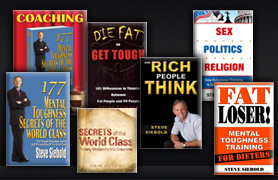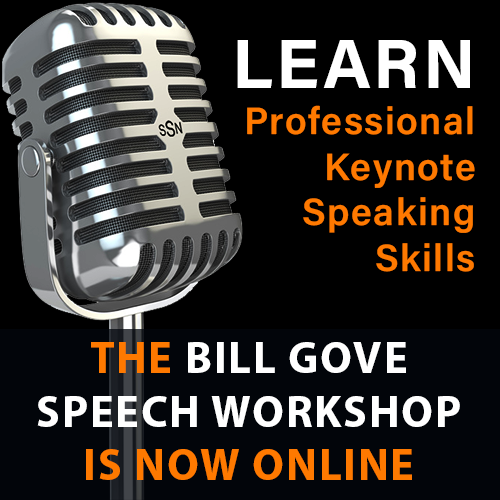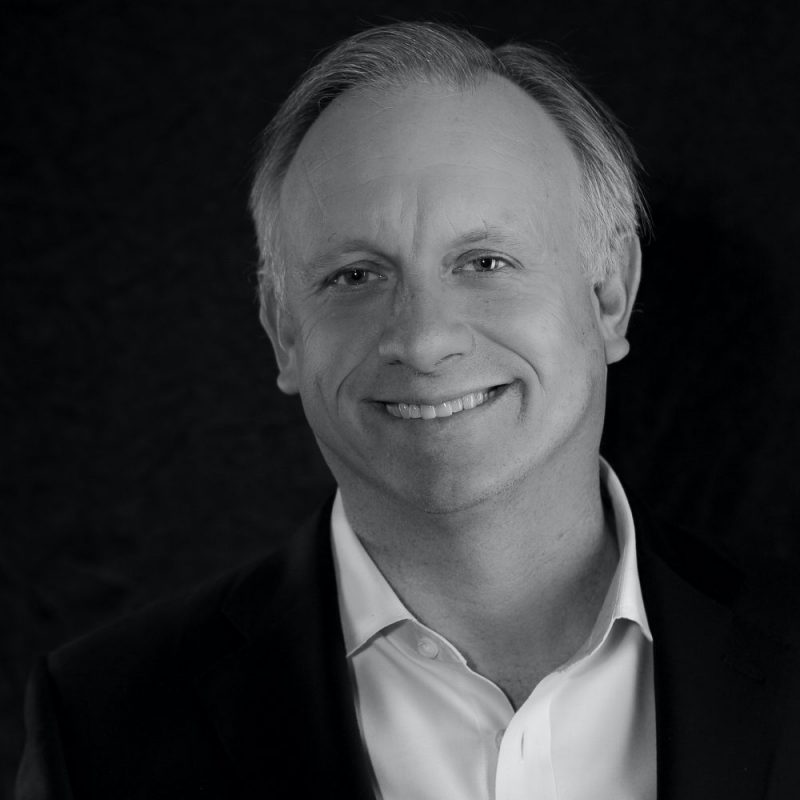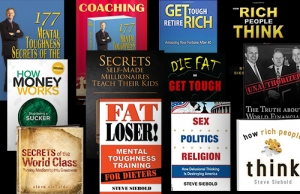The speaking business is ripe with marketing myths, the latest of which is the idea that professional speakers can brand themselves. A few years ago I suffered through a painful session at the National Speakers Association’s CSP/CPAE meeting in Dallas listening to a branding expert trying to persuade us that it was possible to brand yourself as a speaker in the same way Coca-Cola or Holiday Inn. Any marketing expert will tell you this is ridiculous, because speakers, like actors, singers, dancers, are PERSONALITIES…NOT BRANDS. Actor Philip Seymour Hoffman was one of the most famous character actors in Hollywood, and far more famous than any professional speaker in the world. Now that he’s passed away, do you think his “brand” will continue? Of course not, because he was a personality, not a brand. When Ray Kroc, who built McDonald’s, died, McDonald’s restaurants never missed a beat, because McDonald’s IS a brand. Following myths will cost you money in the speaking business, and if you buy into too many of them, it could cost you your career. Watch this video I shot in the green room at FOX NEWS in Los Angeles and I’ll look forward to your comments.
[media id=145]




Really, Steve? Really? Errr, you want to explain Elvis? he’s dead….
ooh and, don’t you love the way the mind works?…just came sailing into my head…err? Walt Disney? He’s dead….I’m sure the Muse will give me countless more…
Tom,
Elvis and Walt Disney were cultural phenomenons. You’re making a false parallel. There has never been a professional speaker at that level, because the general public could care less about personal development. 99% of Americans have never heard of Zig Ziglar. Tony Robbins is a minor celebrity, but not even close to a brand. The speaking industry is 70 years old. Name one speaker who is a brand.
Steve,
Thank you, you have answered a question for me that I did not even know to ask!! Now I will be changing some stuff.
PS and Tom why is your communication so sarcastic? what is wrong with just asking a question and seeking to understand a little bit better without all the written attitude!
Steve,
Thanks for your thoughts on this. I appreciate them even though I disagree.
Zig Ziglar is a brand that’s doing pretty well after his death. And my guess is it will do well far into the future.
Now I do agree that “branding yourself as a speaker in the same way Coca-Cola or Holiday Inn” is just silly. That doesn’t even make sense.
However, I absolutely think personal brands can be done and are important. For example, is “Steve Siebold” not a brand? I think it is. When I think of Steve Siebold I think of public speaking and mental toughness. To me that is branding at its finest – what do people think of you when you’re not around.
Actor Philip Seymour Hoffman chose not to build his brand. That’s why he’s classified as a personality in your eyes. However, if he would have chosen to do things differently, ex the rock group KISS whose non-music brand has made over $500 million, who knows how long his brand would have lasted.
To be honest, I’m surprised at your position on this.
P.S. To say “Tony Robbins is a minor celebrity and not even close to a brand” is just insulting.
Clearly your definition of a brand is different than mine.
Steve,
The personal development field is huge, so why did you say that the general public could care less about personal development? I spoke with Dawn recently and she challenged me to define my topic and what kind of speaker I am. I have been pondering that challenge and what I talk about is personal development. Can you clarify? Thanks, Lee
Hi Steve,
Before we talk about brand..let’s get phenomena out of the way.
You said..”Elvis and Walt Disney were cultural phenomenons. ” They were or are more likely cultural phenomena which is the plural of phenomenon. Two is more than one, I’m sure you would agree.
Now with regard to brand, I believe it is a noun/verb adopted by the internet to mean or suggest that if you are unknown on the internet , there are many ways to get known and this getting known is to get your name in any way you can before gross numbers of people so they know who you are…like cattlemen branding their cows so people know who they belong to. A dynamic public speaker can be branded like a product as presidential candidates were being branded by public relation and advertising specialists. They treated candidates like a product. You are probably branded, but the difference is that it is only for a limited time. A little issue with your reference to PS Hoffman being a personality. Beyonce, Jim Fallon, and and Jay Z are personalities, Hoffman was not known for his personality but for his talent and skill as an unusally fine actor. Let’s give a little respect where respcet is due.
Steve, I understand your point, and I agree that speakers really aren’t a brand in the sense you described. Even those such as John Maxwell who have done a great job of building an organization that will out live him, he isn’t a brand in the ilk of Pepsi or GM. I get that, but I have a question. If you don’t recommend we follow the marketing approach of a brand, then what approach do you suggest? When I’ve heard the “brand yourself” pitch made to speakers I have always filtered it to mean market yourself in a unique way like a brand does so that when people think of your area of specialty they think of you. When people hear “mental toughness” for example you want them to think of you. Isn’t that your brand? Why is that different than what Coke or McDonalds does?
Great reminder, Steve! Thanks!
Ken,
Thanks for your comment. Judging from the roughly 70 year history of the speaking business, the most successful speakers have been created through uniqueness, both in delivery style and point of view on their topic. The speaking business is “owned” by the top 1% of income earners, while the bottom 90% are earning less than 75K per year. (according to an NSA study) The reason (in my opinion) is because most speakers are just copies of their favorite speakers, and they are saying the same things in the same way. The most successful speakers have carved out their own unique philosophy and content, and thats what new and emerging speakers should focus on. How are you different than anyone else in the business? Will anyone pay for that difference? Forget branding and focus on uniqueness and you’re on your way to million dollar speaker status.
Richard,
I think you’re missing the point. PS Hoffman was known for his uniqueness as an actor, and thats what I’m referring to when I say “personality.” I disagree that a public speaker is branded like a Presidential candidate. That’s a false parallel. Presidential candidates are seen by millions of people every day for months, most speakers never speak to more than 300 people in an audience in their entire career. I’ve been in front of over 100 million people in the past two years through TV, radio and print media, and I’m not even close to being a brand. And even if I was, the day I retired or died the so-called brand would be gone, which is what disqualifies me as a brand in the first place! The founder of Coca-Cola is gone, yet because they are a brand it makes no difference. My argument is not one of semantics but of the approach speakers take as they build their careers. Most speakers are broke in an industry paved with gold, and its because of misinformation. I guess the bottom line is if you’re making millions with your approach to the business, keep it. Thanks again for your comment.
Lee,
Thanks for your comment. According to Nightingale-Conant, the largest distributor of personal development products in the industry, approximately 5% of the U.S. population is interested in personal development. The remaining 95% is interested in entertainment. So in the public market we’re talking about 15 million people in the U.S. Internationally the percentage is much smaller. Personal development is not a topic. You need to be much more specific in order to differentiate yourself. Look to your background, experience and expertise and work from there.
John,
Thanks for your comments. We obviously disagree. The bottom line is that if this approach is working for you, use it. Before you do, you may want to check your facts about how well deceased speakers ‘brands” are doing. I think you and I are getting different information. As much as I appreciate the sentiment, I’m no where close to a brand. Neither is Tony Robbins, Wayne Dyer or any other speaker. They are very successful, but they are not brands. 5% of the population knows the names of speakers, the remaining 95% have no idea we even exist. The misconception that the industry is larger than it is skews speakers approach to marketing, and that’s the purpose of this post.
John,
It’s not meant as an insult, but an objective fact. I love Tony Robbins, but the day he disappears his product sales will begin to slip and shortly after they will stop, as the latest and greatest new speaker takes his place. This goes for all speakers, no matter how great they are. 70 years of the history of this industry proves this. Again, build your business your way if it’s working. I’m simply sharing the philosophies that have worked for me and other 7-speaker speakers.
Steve, thanks for responding. Let’s agree to disagree simply because our definition of “brand” is not the same…
By your definition speakers are not brands and can not be brands and they should not try to be. Fair enough. However, you have not said what a speaker should be doing instead of building their brand. If you did then I missed it.
Would you care to share what a speaker should be doing and how they should be doing it?
Thanks!
Hi Steve,
I really get a kick (enjoy) your ability to dodge some of the points I was making or maybe you didn’t think they deserved notice. But I sincerely enjoyed your response. I took issue with the word personality only because of its accrued negativity. And you didn’t thank me for the gramar lesson.
But listen, I am following you like a night stalker. I bought your book 177…great resource and top of the heap. I have followed your ten lectures and your various site recommendations. You are a master in what you know. Hopefully, maybe I can get on the platform with you one of these days.
Blessings,
Richard
Very interesting thread. As someone who has worked in the entertainment industry and also has an invention, this is how I see that they are different. A brand is a product (Coca Cola) and a person is a celebrity (Elvis, Tony Robbins).
Yes, Tony Robbins has products, but I wouldn’t call them a brand. I would call them books, DVDs, etc. Tony Robbins is a celebrity, not a brand. But that’s just my two cents…
SPEAKER GRAMMAR LESSON
@Richard Pratt.
Perhaps the reason Steve didn’t appreciate your grammar lesson is because you were wrong. Well, maybe not wrong, just needlessly pedantic. As I’m being now. Or maybe you are wrong.
In his example, Steve was referring to Elvis and Walt Disney EACH as a separate cultural phenomenon, asking us to consider EACH one together, thus creating the plural, “phenomenons.”
I think another difference in plural/singular usage is the fact that phenomena refers to a subset of behaviors under the set, “celebrity culture phenomena.” Whereas phenomenons refers to two or more specific instances of the celebrity culture phenomenon. In this case, Elvis and Walt Disney.
If one were to speak of attention whoring and manufactured drama as two aspects of the celebrity culture phenomenon, one could refer to them as “phenomena [plural] of celebrity culture.” One would say, “The phenomena of celebrity culture includes attention whoring and manufactured drama.”
If Steve had been speaking about the many phenomena comprising celebrity culture, the plural construction “phenomena” would have been correct. He wasn’t.
Or, to put it less sharply and pedantically, the dictionary currently allows BOTH uses. So Steve is still right but so are you.
But I think I’m righter.